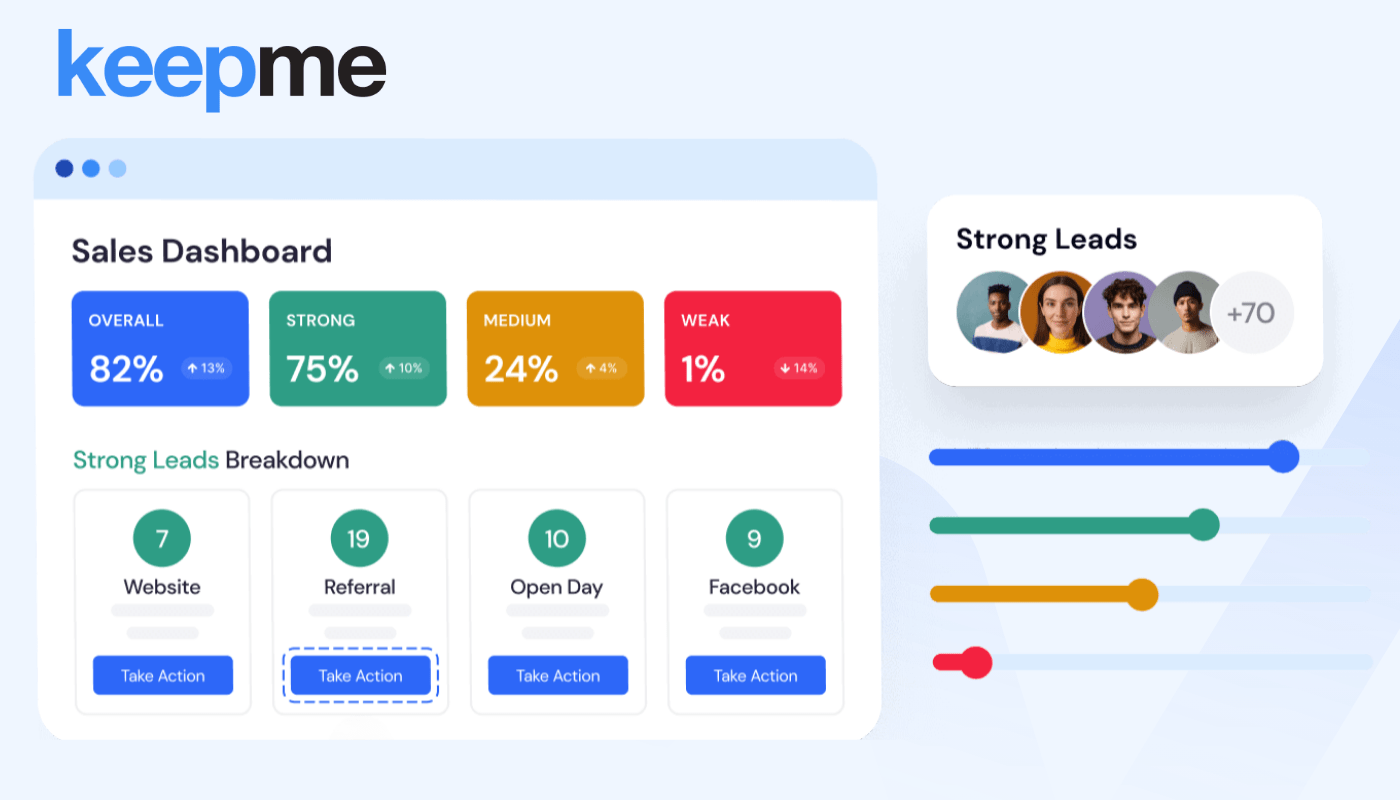AI for Gyms 101: Understanding the Basics


Welcome to the first installment of our blog series on the transformative power of Artificial Intelligence (AI) in the fitness industry. As Keepme's Chief of Staff, I'm thrilled to bring you along on this exploration of how AI can revolutionize gym operations, enhance member experiences, and drive business growth. Today, we'll lay the foundation by introducing basic AI concepts and terminologies, providing a comprehensive understanding of AI's potential in the fitness industry. Let's dive in!
What is Artificial Intelligence (AI)?
Artificial Intelligence, or AI, refers to the simulation of human intelligence in machines programmed to think and learn like humans. These intelligent systems can perform tasks that typically require human intelligence, such as visual perception, speech recognition, decision-making, and language translation.
Let’s make this all a bit more relatable - consider the following:
Imagine you have a helpful robot assistant. This assistant can follow instructions and answer questions, but only if it has been specifically programmed to do so.
This is what we call Rules-Based AI.
It's like having a digital helper that can only do what it's been told to do.
Now, picture a robot that can learn from experience, just like humans do.
This type of AI is called Machine Learning. It can look at a lot of information, find patterns, and make predictions. The more information it has, the better it gets at learning and adapting.
It's like having a robot that can figure things out on its own, without being told exactly what to do.
There's also a type of AI that works a bit like the human brain.
It's called Deep Learning AI. This AI uses something similar to the way our brains process information. It can look at huge amounts of data and use it to do very complex tasks, like driving a car or predicting health problems. It's incredibly smart, but it can be hard for humans to understand how it thinks.
Have you ever wished you could read your customers' minds and give them exactly what they want?
Well, with the help of AI and predictive models, you can come pretty close!
AI can look at information about your members, like how often they visit, what activities they do, how much they spend, and what they look at online. By studying this information, it can then figure out which members might be thinking about leaving the gym.
Key Components of AI
Let’s take a moment and repack what we’ve just covered with some more technical definitions:
Machine Learning: A subset of AI that enables computers to learn from data and improve over time without being explicitly programmed.
Deep Learning: A specialized form of machine learning involving neural networks with many layers (hence ‘deep’), enabling the analysis of large datasets for more complex tasks. This powers the likes of image and speech recognition, and natural language processing.
Natural Language Processing (NLP): Enables machines to understand and respond to human language, but also to generate it - think of language translation or chatbots for example.
AI Terminology and Concepts
Algorithms
Rules or instructions used by AI systems to solve problems or perform tasks. In the context of AI, algorithms help machines learn from data and make decisions.
Data Analytics
Examination of data sets to draw conclusions about the information they contain. AI-driven data analytics can uncover patterns, trends, and insights that inform business decisions and strategies.
Automation
Automation refers to the use of AI to perform repetitive tasks without human intervention. In the fitness industry, automation can streamline processes such as scheduling, billing, and customer service.
 How can it help YOU?
How can it help YOU?
So far the theory is hopefully becoming clear, but how can AI help you deliver even more personalised and effective experiences?
Let’s look at an example:
Picture this - a customer walks into your gym, and thanks to AI, you already have a pretty good idea of what they might need. Maybe they've been focusing on cardio lately, so you suggest a new strength training class to help them achieve their goals. Or perhaps they've been struggling to stick to a healthy diet, so you offer them a personalized nutrition plan based on their preferences and lifestyle.
But it doesn't stop there!
With AI, you can even customize the atmosphere of your gym to suit each customer's tastes. Imagine walking into a gym that's playing your favorite music, has your preferred lighting, and even adjusts the temperature to your liking. It's like having your very own personal gym, right?
By using AI to anticipate your customers' needs and preferences, you can create experiences that are so tailored and effective, they'll wonder how they ever managed without you.
When customers feel this valued and satisfied, they're much more likely to stick around for the long haul.
Still sounding a little too sci-fi? The reality is that AI is already woven through our daily lives. We benefit from it every day, and more than that, already expect the results that it brings as a minimum in a multitude of areas.
How AI is Transforming Industries?
AI is not a buzzword or a theory about the future, it's a powerful tool already driving transformation across various sectors. Let's look at some examples from different industries and consider how AI's success stories can offer valuable lessons for the fitness industry.
Practical Applications of AI for Gyms
Let's dive deeper into some practical applications of AI for gym owners and managers.
Member Management
Predictive analytics can help gyms identify members at risk of leaving and proactively engage them with personalized offers or support. By analyzing data such as attendance patterns and feedback, AI can predict churn and suggest interventions to improve retention.
Personalized Training Programs
AI-driven systems can create customized workout plans based on members' fitness levels, goals, and preferences. These systems continuously adapt the plans as members progress, ensuring they remain challenging and effective.
Operational Efficiency
AI can automate routine tasks such as class scheduling, equipment maintenance, and resource allocation. For example, AI-powered software can analyze class attendance data to optimize scheduling, ensuring popular classes are offered at convenient times.
Marketing and Sales
AI can analyze member data to segment the audience and deliver personalized marketing messages. For instance, AI can identify members who are likely to upgrade their membership and help you target them with tailored offers, increasing revenue.
What are the benefits?
Embracing AI offers numerous benefits for gym owners and managers:
Enhanced Member Experience
AI-driven personalization ensures that each member receives a tailored experience, leading to higher satisfaction and loyalty. Personalized workout plans, nutrition advice, and wellness programs keep members engaged and motivated.
Increased Operational Efficiency
Automation and predictive analytics streamline operations, reducing costs and freeing up staff to focus on member interaction and service improvement. While the idea of streamlining operations is cause for concern in many industries, - as a people-led sector, fitness isn’t one of them. If anything AI will serve to improve the human experience by freeing fitness professionals from many repetitive and administrative tasks and allowing them to concentrate on the human connection. This efficiency translates then, to a better overall member experience.
Improved Decision-Making
AI provides data-driven insights that help gym owners make informed decisions. Whether it's identifying the best leads, predicting member behavior, or optimizing operations, AI offers valuable information for strategic planning, with zero biases for complete objectivity.
 Competitive Necessity
Competitive Necessity
More than merely a competitive advantage, gyms that leverage AI align themselves with a competitive necessity, ensuring they offer superior member experiences and operate more efficiently. This ultimately attracts new members and retains existing ones, driving business growth.
Challenges and Considerations
While AI offers significant benefits, there are challenges and considerations to keep in mind:
Complexity
Implementing AI solutions can be complex, requiring a trusted provider like Keepme to make the best use of your data. The opportunity is huge and must be entrusted to the right partner.
Data Privacy Concerns
AI relies on data, raising concerns about privacy and security. Gyms must ensure they comply with data protection regulations and implement robust security measures to protect member information. With Keepme, this comes built-in. Keepme’s inception ran parallel with deadlines for implementation of GDPR and the California Consumer Privacy Act (CCPA) in 2018, making the platform ideally placed to be on top of this right from the start. Be sure that anyone you trust with your members’ personally identifiable information guarantees high levels of encryption and security with every implementation like Keepme does.
Final Thoughts
In the very recent past many would have discussed AI’s potential to revolutionize the fitness industry, but the reality is that ai for gyms is already here, offering opportunities to enhance member experiences, optimize operations, and drive business growth.
By understanding the basics of AI and its applications, gym owners, operators, and managers can explore how to integrate this powerful technology into their operations.
As we move forward in this series, we'll delve deeper into specific AI applications, success stories, and practical tips for implementation. Stay tuned for the next post, where we'll explore how to leverage AI for personalized member engagement.
Find out more about how AI for gyms is already revolutionizing fitness.
Book a quick discovery call at a time to suit you and learn how Keepme's AI can help with everything from gym sales to member retention and all the steps between.
---3.png)



